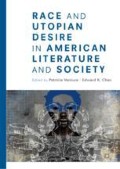Abstract
Very little research on African American utopianism extends into antebellum writing and overlooks the presence of utopian desire in slave narratives. This chapter examines the relationship between utopia and space in two of Frederick Douglass’s autobiographies, arguing that Douglass presents the desire for a better future as dependent on an appropriate space. It concludes with a reading of The Heroic Slave to demonstrate how his utopian desire continued to be expressed in fiction during his time as an abolitionist. While The Heroic Slave ends with a naïve endorsement of life in a British colony, it emphasizes Douglass’s continued attention to the role of space in fostering utopian desire while demonstrating the limits to his own utopian imagination about the space of black freedom.
Access this chapter
Tax calculation will be finalised at checkout
Purchases are for personal use only
Bibliography
Berlin, Ira. Many Thousands Gone: The First Two Centuries of Slavery in North America. Boston: Belknap Press, 1998.
Blight, David. Frederick Douglass’s Civil War. Baton Rouge: Louisiana State University Press, 1989.
Bloch, Ernst. The Principle of Hope. Boston: MIT Press, 1995.
Douglass, Frederick. Narrative of the Life of Frederick Douglass. Boston: Bedford Books, 1993.
Douglass, Frederick. “The Free Negro’s Place Is in America,” In Frederick Douglass: Selected Speeches and Writings, edited by Philip Foner, 176–178. Chicago: Lawrence Hill Books, 1999.
Douglass, Frederick. My Bondage, My Freedom. New Haven: Yale University Press, 2014.
Douglass, Frederick. The Heroic Slave. New Haven: Yale University Press, 2015.
Douglass, Frederick. “The Present Condition and Future Prospects of the Negro People,” In Selected Speeches, 250–260.
Jackson, Sandra and Julie Moody-Freeman, eds., The Black Imagination, Science Fiction and the Speculative. London: Routledge, 2010.
Jameson, Fredric. Archaeologies of the Future: The Desire Called Utopia and Other Science Fictions. London: Verso, 2005.
Jones, Howard. “The Peculiar Institution and National Honor: The Case of the Creole Slave Revolt,” Civil War History 21, no. 1 (1975): 28–50.
Kelley, Robin D. G. Freedom Dreams: The Black Radical Imagination. Boston: Beacon Press, 2003.
Levine, Robert. Martin Delany, Frederick Douglass, and the Politics of Representative Identity. Chapel Hill: University of North Carolina Press, 1997.
Levitas, Ruth. The Concept of Utopia. Oxfordshire: Peter Lang, 2011.
Newman, Lance. “Free Soil and the Abolitionist Forest of Frederick Douglass’s ‘The Heroic Slave,’” American Literature 81, no. 1 (2009): 127–152.
Shor, Francis. “Utopian Aspirations in the Black Freedom Movement: SNCC and the Struggle for Civil Rights, 1960–1965.” Utopian Studies 15, no. 2 (2004): 173–189.
Sinha, Manisha. The Counterrevolution of Slavery: Politics and Ideology in Antebellum South Carolina. Chapel Hill: University of North Carolina Press, 2000.
Stowe, Harriet Beecher. Uncle Tom’s Cabin. Oxford: Oxford University Press, 1998.
Walker, David. Walker’s Appeal, in Four Articles; Together with a Preamble to the Colored Citizens of the World, But in Particular and Very Expressly, to Those of the United States of America. http://docsouth.unc.edu/nc/walker/walker.html.
Yarborough, Richard. “Race, Violence, and Manhood: The Masculine Ideal in Frederick Douglass’s “The Heroic Slave,” In Frederick Douglass: New Literary and Historical Essays, edited by Eric Sundquist, 166–188. Cambridge: Cambridge University Press, 1990.
Author information
Authors and Affiliations
Editor information
Editors and Affiliations
Rights and permissions
Copyright information
© 2019 The Author(s)
About this chapter
Cite this chapter
Lemke, D. (2019). Frederick Douglass’s Utopia: Searching for the Space of Black Freedom. In: Ventura, P., Chan, E. (eds) Race and Utopian Desire in American Literature and Society. Palgrave Macmillan, Cham. https://doi.org/10.1007/978-3-030-19470-3_2
Download citation
DOI: https://doi.org/10.1007/978-3-030-19470-3_2
Published:
Publisher Name: Palgrave Macmillan, Cham
Print ISBN: 978-3-030-19469-7
Online ISBN: 978-3-030-19470-3
eBook Packages: Literature, Cultural and Media StudiesLiterature, Cultural and Media Studies (R0)

